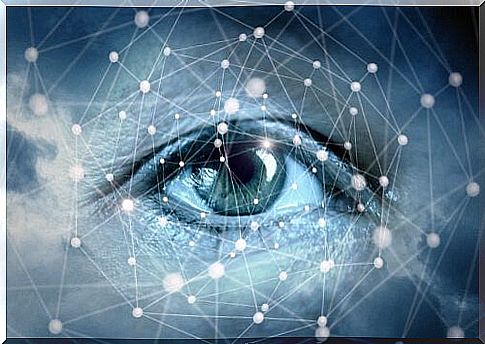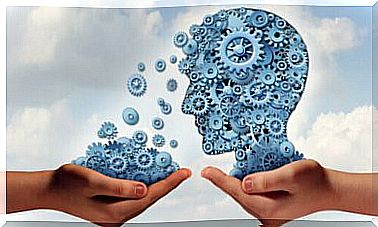How To Train Attention According To Daniel Goleman

According to Daniel Goleman, to train attention, we must focus on two dimensions that we can identify as internal and external.
In a world so full of stimuli, pressures and demands, Goleman says we are neglecting the inner universe in which our feelings, fears and needs are. Likewise, we are also forgetting to pay attention to the most important aspects of our environment.
Focus, attend, connect, discern, concentrate and pay attention. All these processes are basic in our daily lives to know how to make the most of our reality. Let’s think about it for a moment. Dimensions such as stress, anxiety or depression are states in which our gaze becomes hazy, thus confusing details with the superfluous.
When the brain keeps our senses alert, connected to various stimuli, while being busy with a thousand thoughts, sensations, emotions and worries, the world becomes chaotic. Nobody can be productive in a similar environment; what’s more, no one will be happy in a saturated micro-universe in which no light fits.
Daniel Goleman wrote Foco in 2013 for the same purpose: to teach us how to train our attention to get out of this maze of chaos and suffering. In a world characterized by distraction, we are forced to redirect our gaze, to be quiet and focus on what is really worth it.

Secrets for training attention according to Daniel Goleman
To train attention, according to Daniel Goleman, we must identify an important point. Attention, like most of our basic psychological processes, is like a muscle, it benefits from training.
If we exercise it daily with willpower and determination, we will gain in well-being. So the key is to be aware of this need. We say this for a very striking fact that is happening frequently.
Our electronic devices are increasingly endowed with greater “intelligence”. Our cell phones and computers are gradually replacing many of the processes that we used to do in our minds.
We are so unaccustomed to these devices that our generation is linked almost exclusively to them, and not to the scenarios that Daniel Goleman defines as the most important: our interior and our most significant social context.
Little by little, by neglecting these spheres, but by “infecting” ourselves at the same time with so much stimulus, information, pressure and data, we end up exhausted. What we know as a “cognitive super effort” happens. It’s something similar to when we make a super physical effort: we can’t give more of ourselves and we become weak.
Likewise, this exhaustion makes us more vulnerable to multiple adverse feelings: stress, anxiety… Let’s see what practices or strategies can help us train our attention.
Taking possession of your mind
William James is one of the most remarkable figures in the history of modern psychology. In his time, he defined attention in an apt and inspiring way: it is the possession by the mind in a clear and vivid way of one of several objects or trains of thought simultaneously possible.
- Attention is a tool of power. It is to direct the gaze, will and concentration to a specific point. In turn, for this takeover, we need our emotions to be in harmony, in a proper calm;
- By understanding what the anatomy of attention is, it will be easier to improve it.

The recipe for self-control
The training of attention involves the practice of self-control. We have so many stimuli around us and so many ideas, thoughts and sensations that, little by little, the mind becomes more erratic, less centered.
A study conducted at Pennsylvania State University in the United States by Dr. Heather A. Wadlinger revealed that attention is directly related to emotions and, consequently, by taking care of the first dimension, we improve the second. But how can we do this?
The recipe for self-control to train attention and regulate emotions, according to Daniel Goleman, is mindfulness, or mindfulness. So, in his book The Art of Meditation , he teaches us how to do this and what benefits we can get from the ancient exercise of meditation.
Internal connection and external connection
Those who walk in their daily lives disconnected from their internal reality end up losing themselves, sooner or later. Those people who fail to connect with who truly matter and what is truly valuable around them lose quality of life and happiness.
- We must be able to listen, not leave for tomorrow what hurts, bothers or worries;
- Likewise, it is essential that we become fully aware of ourselves in every moment ; awareness of what we need, what we deserve, what is happening around us;
- On the other hand, an aspect that Daniel Goleman indicates as essential for training attention is taking care of our empathy. With it, we can connect with others. With it, we discover what is important in us and also in those around us.

Do you do what you like?
Do you like what you do in your day to day? This is one of the questions that Daniel Goleman asks us in his book Foco . Something that the famous author of The Emotional Intelligence points out to us is that people spend a great deal of their time upset or stressed.
The mere fact of not finding meaning or purpose in our lives makes our attention weaken. There is nothing motivating, there are no stimuli, and the brightness of everyday life that makes us be more creative and focus on what interests us loses its strength.
Sometimes we tend to give in to reality and dismiss the idea of imposing our preferences. We are not always lucky enough to have a passionate job or a routine full of great stimuli. However, it is better that there is a glow. We must have purposes, hobbies we enjoy, people who give us energy and joy in our lives.
Purposes help us focus attention. Likewise, an emotional state that is favorable also favors better management of attentional resources.
These are, without a doubt, small aspects on which we must reflect in order to improve our quality of life. Let’s do this, train our attention, being careful not to lose our enthusiasm for who we are and what we have.








